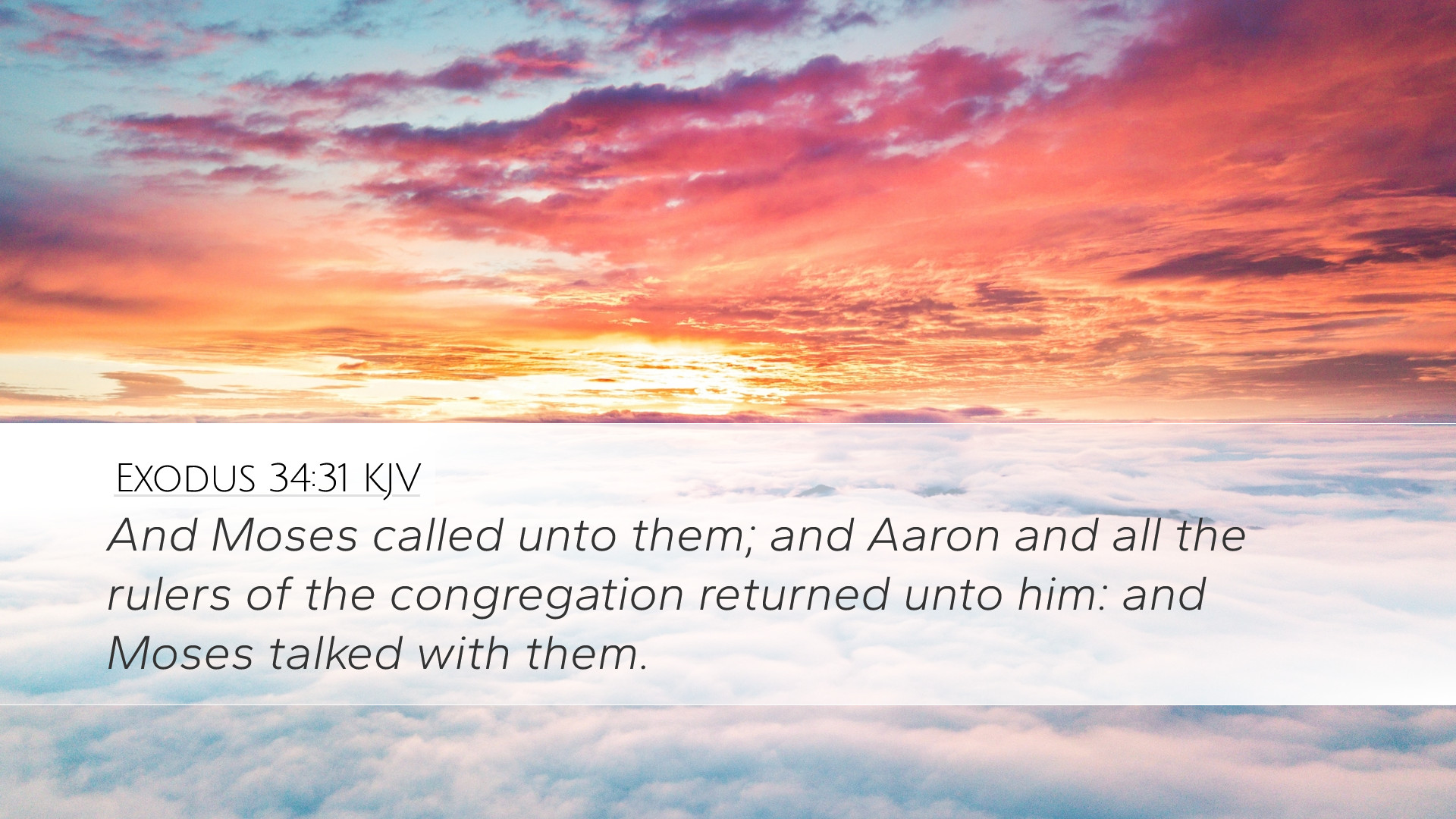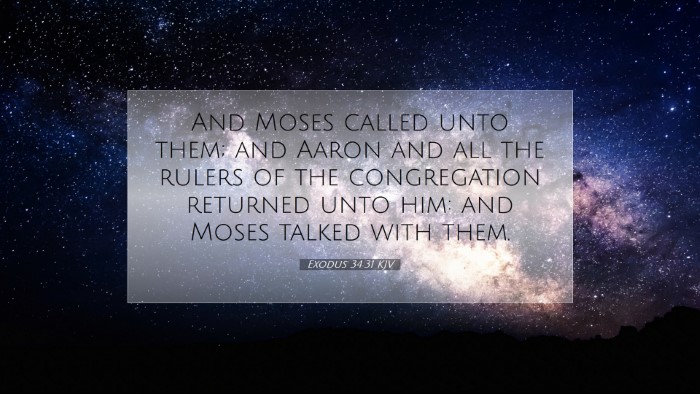Commentary on Exodus 34:31
Text: "Moses called unto them; and Aaron and all the rulers of the congregation returned unto him: and Moses talked with them."
Introduction
This passage marks a significant moment in the relationship between God, Moses, and the people of Israel. As we explore this verse, we aim to uncover the deeper meanings and implications behind Moses' actions and the significance of God's covenant with His people.
Contextual Analysis
The events of Exodus 34 transpire after Moses's second ascent to Mount Sinai, where he receives a new set of tablets containing the Ten Commandments, following the incident of the golden calf. This chapter emphasizes themes of divine mercy, covenant renewal, and the pursuit of holiness among the Israelites.
Insights from Matthew Henry
Matthew Henry draws attention to the leadership role of Moses in this passage. He notes:
- Moses as Mediator: Moses functions as the mediator between God and the people, demonstrating the essential role of leaders in guiding their communities toward divine revelation.
- Community Response: The return of Aaron and the rulers signifies the collective acknowledgment of God's authority, showcasing their willingness to receive instruction and guidance.
Henry stresses that Moses' discussions with the leaders highlight the importance of communal engagement in spiritual matters and the necessity of listening to divine instruction for the congregation’s spiritual well-being.
Insights from Albert Barnes
Albert Barnes provides a specific analysis of the term "talked" in this verse, elaborating on the nature of communication between Moses and the leaders:
- Intentional Dialogue: Barnes suggests that Moses did not merely share orders from God, but rather engaged in a thoughtful discussion, reflecting the importance of dialogue in leadership.
- Listening and Obedience: He emphasizes the need for leaders to listen attentively to God's word and to be obedient to its directives, as this forms the foundation of spiritual leadership.
Furthermore, Barnes highlights that the engagement between Moses and the congregation showcases the continuity of God’s covenant and the responsibility placed upon the leaders to convey God’s message faithfully.
Insights from Adam Clarke
Adam Clarke provides a detailed examination of the text, drawing out additional theological implications:
- Covenantal Significance: Clarke draws attention to the fact that Moses' interaction symbolizes the renewal of covenantal promises and responsibilities, which they must actively uphold.
- Leadership in Crisis: He points out that Moses’ call to leaders signifies the necessity of strong leadership during transitional phases, particularly after the people’s sin with the golden calf.
Clarke asserts that this passage serves to remind leaders of their duty to convey God’s word clearly and to guide their people in accordance with His instructions, particularly in moments of communal distress.
Theological Implications
The engagement between Moses and the leaders has profound theological implications:
- The Nature of Divine Communication: The way Moses calls the leaders underscores that God’s communication is meant to be shared, reinforcing the importance of community in divine revelation.
- Leadership and Accountability: The roles of leaders are not merely administrative; they bear spiritual responsibility to their people. This sets a precedent for pastoral leadership today, emphasizing the need for bishops, pastors, and elders to faithfully proclaim God’s word.
Practical Applications
For pastors, students, theologians, and scholars, the commentary on Exodus 34:31 offers several practical applications:
- Engagement with Scripture: Just as Moses engaged with the leaders, modern spiritual leaders are called to facilitate discussions around Scripture to foster understanding and spiritual growth.
- Community Leadership: Recognizing the significance of spiritual leaders, congregants should support their leadership and hold them accountable to God’s word, promoting a culture of mutual respect and responsibility.
- Understanding Covenant Relationships: Engaging with the concepts of covenantal relationships encourages deeper reflections on how we relate to God and one another, prompting believers to consider their commitments and responsibilities within their community.
Conclusion
In summary, Exodus 34:31 serves as a poignant reminder of the vital roles of communication, leadership, and community in the spiritual journey of believers. By examining this verse through the insights of historical commentaries, we gain a richer understanding of God's expectations for His people and the profound responsibilities of their leaders.


